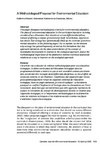
Please use this identifier to cite or link to this item:
http://ricaxcan.uaz.edu.mx/jspui/handle/20.500.11845/256Full metadata record
| DC Field | Value | Language |
|---|---|---|
| dc.contributor.other | 0000-0002-7441-3233 | |
| dc.coverage.spatial | Global | es_ES |
| dc.creator | Foladori, Guillermo | |
| dc.date.accessioned | 2017-05-24T13:44:15Z | |
| dc.date.available | 2017-05-24T13:44:15Z | |
| dc.date.issued | 2005-04-10 | |
| dc.identifier | info:eu-repo/semantics/publishedVersion | |
| dc.identifier.issn | 1205-5352 | es_ES |
| dc.identifier.uri | http://hdl.handle.net/20.500.11845/256 | |
| dc.description | This paper discusses methodological criteria for environmental education. The place of environmental education in the curriculum has led to its being considered as a dimension that should cut across different disciplines, instead of offering a corpus of contents by itself. Nevertheless, experience has shown that ecology has systematically filled up the contents of environ- mental education. In the following pages I try to explain: (a) the reasons why ecology has gained hegemony, as well as the limitations that this approach represents; (b) the place and evolution of the concept of Sustainable Development in relation to the ecological approach; and (c) the methodological importance of the distinction between technical and social relations as a way to improve on the ecological approach | es_ES |
| dc.description.abstract | Este artículo discute criterios metodológicos para la educación ambiental. El lugar de la educación ambiental en el plan de estudios ha llevado a su Considerada como una dimensión que debe recortar diferentes disciplinas, En lugar de ofrecer un corpus de contenidos por sí mismo. Sin embargo, la experiencia Ha demostrado que la ecología ha llenado sistemáticamente los contenidos de Educación mental. En las siguientes páginas intento explicar: (a) las razones Por qué la ecología ha ganado la hegemonía, así como las limitaciones que esta Enfoque representa; B) el lugar y la evolución del concepto de Desarrollo sostenible en relación con el enfoque ecológico; Y (c) el Importancia metodológica de la distinción entre los aspectos técnicos y Las relaciones humanas como una forma de mejorar el enfoque ecológico | es_ES |
| dc.language.iso | eng | es_ES |
| dc.publisher | Lakehead University | es_ES |
| dc.relation | https://cjee.lakeheadu.ca/article/view/182/23 | es_ES |
| dc.relation.uri | generalPublic | es_ES |
| dc.rights | Attribution-NonCommercial-ShareAlike 3.0 United States | es_ES |
| dc.rights.uri | http://creativecommons.org/publicdomain/zero/1.0/ | * |
| dc.source | Canadian Journal of Environmental Education, 10, Spring | es_ES |
| dc.subject.classification | CIENCIAS AGROPECUARIAS Y BIOTECNOLOGIA [6] | es_ES |
| dc.subject.other | info:eu-repo/classification/Educación ambiental | |
| dc.subject.other | info:eu-repo/classification/Desarrollo sustentable | |
| dc.subject.other | info:eu-repo/classification/Ecología | |
| dc.subject.other | info:eu-repo/classification/Ecology | |
| dc.title | A Methodological Proposal for Environmental Education | es_ES |
| dc.type | info:eu-repo/semantics/article | es_ES |
| Appears in Collections: | *Documentos Académicos*-- UA Estudios del Desarrollo | |
Files in This Item:
| File | Description | Size | Format | |
|---|---|---|---|---|
| Foladori.A Methodological Proposal for Environmental Education.pdf | Artículo Principal | 408,57 kB | Adobe PDF |  View/Open |
This item is licensed under a Creative Commons License
